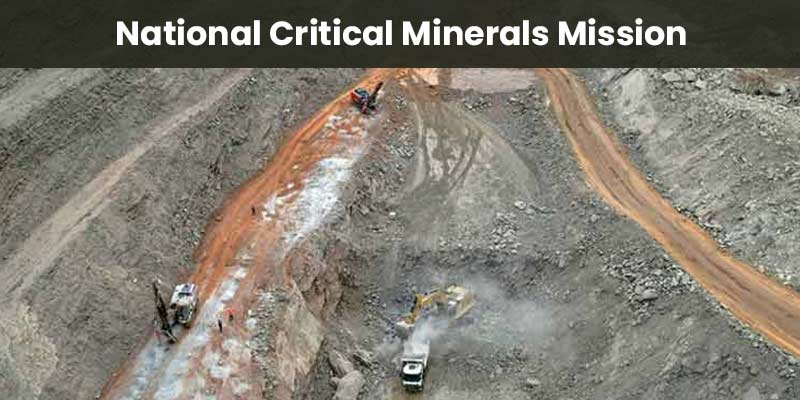- India
- Apr 17
National Critical Mineral Mission
• The Ministry of Mines issued guidelines for setting up of Centres of Excellence (CoE) under the National Critical Mineral Mission (NCMM).
• This is in pursuance to a key pillar of the Mission, which is research and technology development in critical minerals.
• Critical raw materials form the crucial supply chain for emerging sectors of clean energy and mobility transition, in addition to advanced technology and strategic sectors like electronics, defence, space, etc.
National Critical Mineral Mission
• Critical minerals are essential for economic development and national security. The lack of availability of these minerals or even concentration of existence, extraction or processing of these minerals in few geographical locations may lead to supply chain vulnerability and disruption.
• There is a need to establish an effective framework for India’s self-reliance in the critical mineral sector.
• In line with this vision, Finance Minister Nirmala Sitharaman announced the setting up of the Critical Mineral Mission in the Union Budget for 2024-25.
• In January, the Union Cabinet approved the launch of the National Critical Mineral Mission (NCMM) with a total outlay of Rs 34,300 crore spread over seven years.
• The public sector enterprises are expected to contribute Rs 18,000 crore to the mission which aims at promoting exploration of critical minerals within the country and at offshore locations.
• The NCMM will encompass all stages of the value chain, including mineral exploration, mining, beneficiation, processing, and recovery from end-of-life products.
• The mission will intensify the exploration of critical minerals within the country and in its offshore areas.
• It aims to create a fast-track regulatory approval process for critical mineral mining projects.
• Additionally, the mission will offer financial incentives for critical mineral exploration and promote the recovery of these resources from overburden and tailings.
• The mission aims to encourage Indian public sector enterprises and private sector companies to acquire critical mineral assets abroad and enhance trade with resource-rich countries.
• It also proposes development of a stockpile of critical minerals within the country.
• The mission includes provisions for setting up of mineral processing parks and supporting the recycling of critical minerals. It will also promote research in critical mineral technologies and proposes setting up a Centre of Excellence on Critical Minerals.
• Adopting a whole-of-government approach, the mission will work closely with relevant ministries, PSUs, private companies, and research institutions to achieve its objectives.
• Under the NCMM, Geological Survey of India (GSI) has been assigned to carry out 1,200 exploration projects from 2024-25 to 2030-31.
Setting up of Centres of Excellence
• In order to develop, demonstrate and deploy technologies in an end-to-end systems approach, it is essential to conduct R&D so as to reach higher Technology Readiness Levels (TRL).
• CoEs will identify, develop and implement extraction process and beneficiation technologies for a host of critical minerals from multiple sources and conduct directed R&D.
• Under this new initiative, reputed academic/R&D institutions, as per eligibility prescribed, will be evaluated and recognized as CoEs for R&D in critical minerals.
• CoEs will undertake innovative and transformational research to strengthen and advance the nation’s science and technology capability in the area of critical minerals.
• CoEs will aim at undertaking cutting edge research and promoting inter-/multi-disciplinary approaches to problem solving in critical minerals domain.
• A CoE will operate as a consortium, on a hub-and-spoke model, to leverage R&D in critical minerals and pooling the core competence of each constituent under one umbrella.
• As part of the process to recognise CoEs, the ministry will call for proposals from eligible institutes shortly.
Manorama Yearbook app is now available on Google Play Store and iOS App Store

